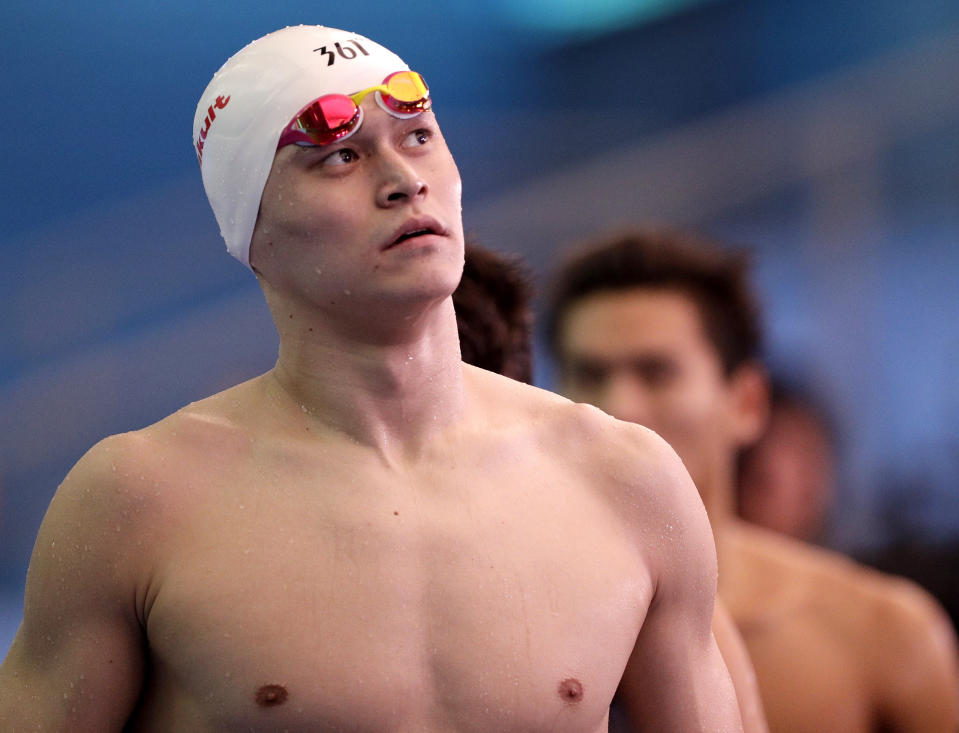Sun Yang, 3-time Olympic gold medalist, banned 8 years in controversial drug testing case

Sun Yang, China’s most decorated swimmer and one of the sport’s biggest stars, was banned for eight years on Friday for breaking anti-doping rules in an incident that involved his mother instructing security to smash his blood sample container with a hammer.
The three-time Olympic gold medalist will miss the 2020 games in Tokyo.
The Court of Arbitration (CAS) ruled that Sun, 28, was guilty of refusing to cooperate with sample collectors during a September 2018 visit to his home. It levied the maximum punishment requested by the World Anti-Doping Agency (WADA), which had appealed a decision by the FINA Doping Panel. That group gave Sun a slap on the wrist, determining he had not committed a violation due to incorrect doping control protocol.
The ruling was based on previous transgressions by Sun and follows a rare November hearing in open court that consisted of translation issues.
Sun: Officials didn’t have paperwork for test
Three officials were sent by a Swedish firm to get blood and urine samples from Sun late on Sept. 4, 2018. Athletes notify officials when and where they will be available for one hour each day for drug testing.
The visit ended with his mother telling one of Sun’s security guards to smash the container that had Sun’s blood. The guard did so with a hammer.
Sun and his entourage accused the officials of not having the correct paperwork for the drug testing. The six-time Olympic medalist refused to submit to a urine sample.
CAS holds public trial for Sun
The issue was initially dealt with by the FINA Doping Panel. It ruled the International Standard for Testing and Investigations (ISTI), the protocol adopted by WADA for drug testing, was not properly followed.
The panel reprimanded Sun and his group, and cited doubts about the credentials shown by the officials in January 2019.
WADA filed an appeal and Sun asked for a public trial. The 20-hour hearing was broadcast from Switzerland on the CAS website and was plagued by translation issues, per the New York Times.
Chinese swimmer Sun Yang explains, at the Court of Arbitration for Sport, the circumstances under which his entourage members smashed the vials containing his blood samples pic.twitter.com/tMEpPEqirn
— Reuters (@Reuters) November 15, 2019
The lawyer for WADA told the Times it wasn’t clear if Sun was purposely evasive or could not understand the questions. The verdict was delayed for final translations.
CAS delivers 8-year ban, maximum asked
CAS ruled in a unanimous decision that the officials in charge of the testing “complied with all applicable requirements as set out in the ISTI.” It further found that Sun did not have “compelling justification” to destroy the sample and skip the test even if he believed it to not be in compliance.
“As the Panel noted, it is one thing, having provided a blood sample, to question the accreditation of the testing personnel while keeping the intact samples in the possession of the testing authorities; it is quite another thing, after lengthy exchanges and warnings as to the consequences, to act in such a way that results in destroying the sample containers, thereby eliminating any chance of testing the sample at a later stage.”
The ban begins on the date of the decision (Feb. 28, 2020) and runs through February 2028. As well as this summer’s Olympics, it covers Paris 2024 as well.
Sun’s past with drug testing, controversy
WADA asked for a ban between two and eight years. CAS said in its release it was going with the maximum given Sun’s first anti-doping violation in June 2014.
Sun, the first Chinese swimmer to win Olympic gold, never missed a major event while banned for three months in 2014 by Chinese authorities. It was not announced until it ended and was the first time FINA was criticized for protecting Sun, one of its biggest stars.
Sun has golds from the 400 and 1,500 meters in London and the 200 in Rio de Janeiro in 2016. He has six Olympic medals in total.
He has 11 golds in five straight world championships from 2011-19. They’re in each freestyle distance from 200 to 1,500 meters. He has nine gold medals at three Asian Games.
CAS ruled that Sun could keep his two world titles won in South Korea in 2019 given that Sun had negative doping tests shortly before and after the aborted one.
In that meet, competitors refused to shake hands with him and one refused to be on the podium with him.
More from Yahoo Sports:

